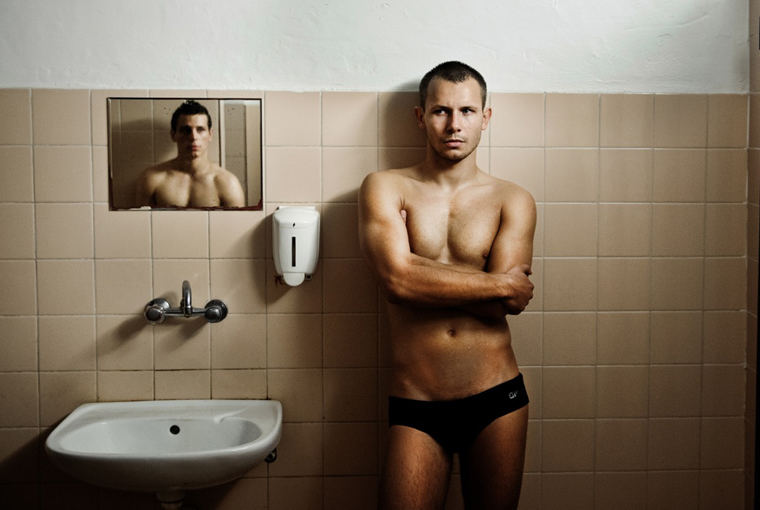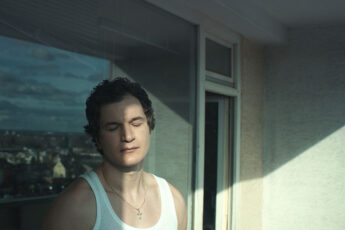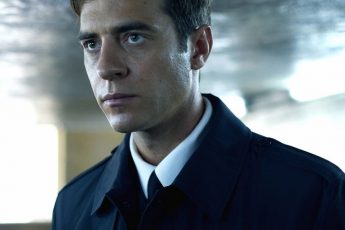Diving Right In... But Not Making a Splash
Tomasz Wasilewski’s Floating Skyscrapers (Płynące wieżowce, 2013)
Vol. 40 (April 2014) by Jack Page
Tomasz Wasilewski’s Floating Skyscrapers marks Polish cinema’s first foray into gay cinema. But contemporary independent film from all over Europe has seen an emergence in national representations of homosexuality. France (Blue is the Warmest Colour and Stranger by the Lake), Germany (Free Fall), Israel (Yossi), Belgium (North Sea Texas), the UK (Weekend), all of which foreground domestic dramas and crises of same-sex relationships on screen. So does Wasilewski’s second feature film resist conforming to a formulaic depiction of cinematic homosexuality and gay culture or does it simply belong with the pre-existing representations and ideologies?
The film chronicles a young Polish man’s internal struggle with his sexual identity and the impact it subsequently has on his long-term girlfriend, mother and gay lover. Kuba is a promising swimmer and practicing for tryouts in an upcoming swimming competition. His supportive girlfriend Sylwia works as a waitress and they both live together in his pushy mother’s apartment. With the arrival of the handsome stranger Michal, Kuba’s homosexual awakening can no longer be ignored and an inexorable – and ultimately unsustainable – romantic entanglement with Michal is realized. As a result, this leads to Kuba’s disenfranchisement from his mother, an irreparable disconnection with Slywia and Michal’s untimely death at the hands of a homophobic gang.
In the beginning of the film, while accompanying Sylwia to an art gallery opening, Kuba insists on numbing himself with drugs and alcohol in order to endure an evening of not fitting in. His bad manners continue at home, behaving rudely and inappropriately regardless of the situation. He ignores the sexual advances of his girlfriend to massage his mother in the bath tub or furtively text his potential gay love interests. Mateusz Banasiuk’s performance is understated but nonetheless impressive, bringing sympathy towards a character who risks being portrayed as a mere brat. His silence often conveys a charismatic sense of defiance and unwillingness to confront his repressed homosexuality. Meditative long takes and extended sequences devoid of soundtrack or dialogue also signify Kuba’s passive aggression. The recurring quietness that flows throughout Floating Skyscrapers is used as an aural equivalent to the safe deftness he experiences diving underwater. Submerged, he is immune to the cruelty and judgment of others as he swims in close proximity to his seminaked, athletic male competitors. Outside of such mitigating circumstances, Kuba’s short temper and defensive machismo leads to violent outbursts when provoked with homophobic insults from strangers (who will later enact their revenge on Michal).
Michal, played by a perfunctory Bartosz Gelner, remains an enigmatic figure, with his commitment to Kuba uncertain. Michal and Kuba’s passion is short-lived or, at least, it does not have time to flourish during the narrative’s development. Michal’s empty, dead eyes hold a neutral glare rather than a longing one and this very ambiguity allows the character to symbolize any-man-whomever. His ordinary attractiveness and blank-slate personality is not accidental. Gelner’s unnatural acting style amplifies the tragic dynamic of Michal and Kuba’s relationship: Kuba is chasing a ghost.
The absence of nature seems to dehumanize and de-romanticize the city of Warsaw. Instead, Wasilewski focuses on the looming coldness and hardness of the geometric architecture. The mise-en-scène is filled with delineated spaces such as the strong, white lines of the car park, highway and racing track, as well as the deep blue lanes of the swimming pool and the rusted, metallic train track of the railway. These demarcated, set spaces act as barriers that hinder human interaction and trap Kuba into his everyday routine. The lines suggest a predetermined path that must be followed and one that Kuba longs to stray from. The cinematography captures the municipality of Warsaw, re-imagining the city as an urban landscape incapable of harboring an impossible love affair. In a striking scene, to attempt to break free from their formulaic rituals, Kuba, Michal and Sylwia retreat back to nature – the river to be precise – a source untouched by the harsh concreteness of the cityscape. It offers the opportunity to cleanse, where swimming seems to baptise the characters, allowing them to be born again (and Kuba does begin to fulfill his homosexual desires wholeheartedly after this sequence).
However, the gym is actually conveyed as a place of temptation. Floating Skyscrapers opens with a sequence in which Kuba’s heavy breathing can be heard among the changing room stalls, in one of which he and another male cruiser are performing oral sex. It is also at the gym where male bodies are constantly on display whereby the camera adopts Kuba’s queer point of view, sexualizing the masculine physique in motion. Limbs and muscles drip with sweat and water as they train rigorously with intense, almost orgasmic, expressions on their faces. Perhaps this is the film’s most notable flaw. The people depicted are too beautiful, with perfectly toned and healthy bodies. In this way, the model-like casting of actors seems to undermine the diegetic realism of the aesthetic and dialogue.
Consequently, Floating Skyscrapers shares an all too safe and familiar depiction of repressed homosexuality as the majority of popular gay and lesbian European cinema. The film offers no new perspective, nor a different variation on the narrative or visual style of similar recent independent feature films. Devoid of any ideological or political agenda, Wasilewski’s vision is considerably tame, but accomplished, yet lacking in any real progression and importance in regards to its increasingly prominent subject matter.




Leave a Comment